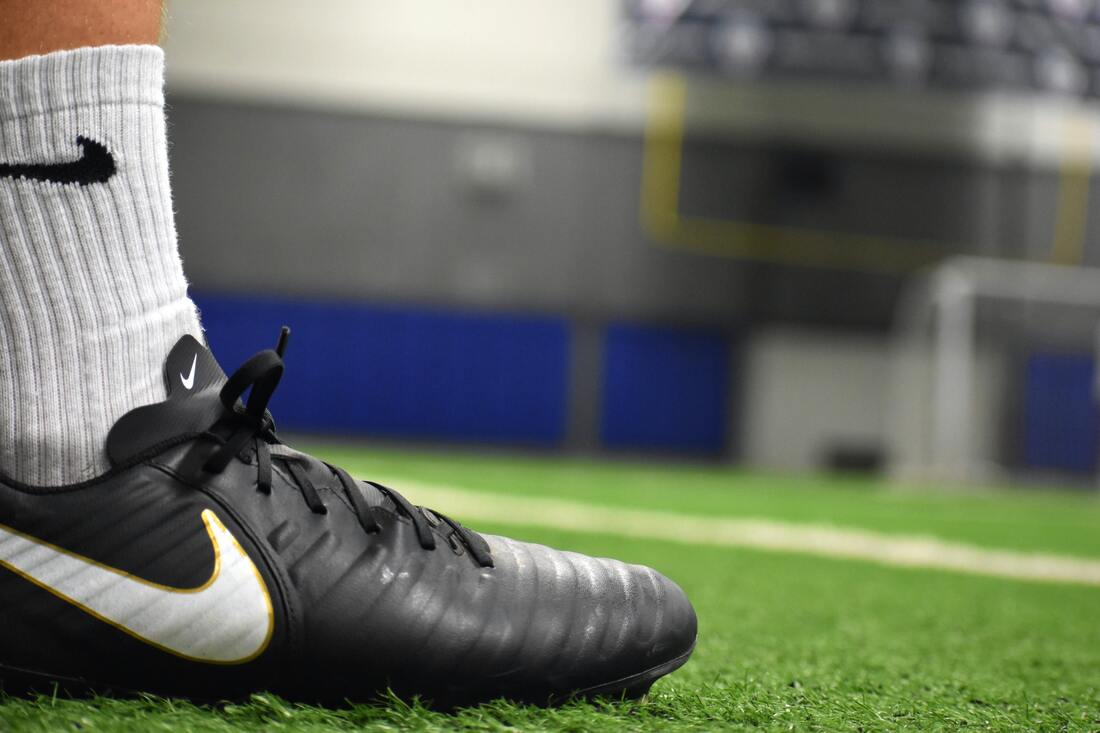|
By Caroline Roberts, EDC Intern Dear Athlete, Congratulations on making it to this level in your athletic career! Congratulations on all your hard work paying off to get you to this moment. Congratulations on being part of that (approximately) 7% of high school athletes that move on to play at the college level. Congratulations, you deserve to take pride in this accomplishment. However, with this experience, please be sure to reflect and stay informed about the less glamorous territory that may come with being a collegiate athlete. I know putting in hours of additional work after your mandated practice time may seem like the secret to success at this level, however it is not. I know only eating “clean” foods in order to “stay lean” may seem like the secret to success at this level, however it is not. Restricting caloric intake in order to lose weight so that you “move faster” may sound like a productive approach, however it is not. At times during your sport, it may seem appropriate to base your worth on your success on the field, court, track, etc., however it is not. The secret to being a successful college athlete is finding a healthy balance. When you enter the collegiate level of any sport, the expectations of your coaches, teammates, and even family members seem to be much higher than they were at any point in your athletic career prior. It’s very easy to want to exceed all these expectations by utilizing whatever your version of “the secret to success” is, yet this distorted approach can oftentimes create an unhealthy mindset that can lead to anxiety, depression, and/or eating disorders. So how do you find a healthy balance for both your mental and physical health? Well first, you must reflect. It can be difficult to acknowledge or even realize that your behavior could be potentially harmful to your health, but there are many signs that your body and brain display that can be clear indicators. 1. Your body is in constant pain or you constantly obtain overuse injuries While it is normal to play through some minor aches and soreness, if your body is constantly hurting this could be a red flag. As an athlete it is crucial to take care of your body so that you cannot only thrive as an athlete but as an individual as well. Injured athletes are impacted far beyond the quality of their physical state. Being injured greatly increases an athletes’ risk of developing anxiety and depression due to not being able to perform in their sport. So, listen to the aches of your body in order to protect both your physical and mental health! 2. You feel extremely fatigued all the time Feeling tired is different from feeling fatigued. If you are taking proper care of yourself, i.e., getting sufficient rest and nutrients, it is likely that you may still feel tired due to the amount of physical activity that athletics demand, but you should not feel fatigued. You may feel tired from an early morning lift, or a late-night training session, however fatigue is feeling constantly tired and weak. Fatigue can be a symptom of anxiety, depression, and eating disorders. If you notice you are feeling this way, reflect on your moods and eating habits, and if necessary, reach out to a family member, friend, or doctor for support! 3. Your weight fluctuates greatly in the downward direction in a short duration of time Weight fluctuation is normal, especially as an athlete. This fluctuation can oftentimes be due to loss of water weight through sweating, or a gain in weight due to gaining muscle. However, if you are noticing that your weight is trending down at a rapid rate, it may be time to reflect on your eating habits! With the increased exercise load that athletes endure, it is crucial to properly fuel your body. The notion that “if you are thinner or leaner you will perform better” is FALSE. This is a common misconception for athletes that leads to unhealthy disordered eating. Thinking with this mentality, combined with other overwhelming anxieties that may come with playing sports, can lead to disorders such as orthorexia nervosa or anorexia nervosa. If you notice that you are struggling mentally and physically with your relationship to food, reach out to a loved one or doctor for support! And remember, your weight has nothing to do with your performance, as long as that weight is appropriate for your body! 4. You no longer enjoy something you once loved This may be the biggest indicator your behaviors surrounding your athletic career are at an imbalance. This is the game you are supposed to love, so if you find yourself no longer excited to play your sport, then you may be experiencing burnout. This is a condition in which athletes no longer enjoy their sport, often feeling fatigued and showing a decline in their performance. While burnout can occur just from a college athletes’ busy schedule, the severity of it is often amplified by overtraining or the toxic misconceptions surrounding “the ideal athlete”. This condition tends to lead to anxiety and/or depression. If you find yourself feeling this way, don’t panic! Sometimes the solution is just a break or some time away from your sport. Another solution may be reaching out to your schools’ Sports Psychologist. College is supposed to be fun! Playing your sport is supposed to be fun! Creating a healthy balance to ensure optimal mental and physical health, will help you not only find success in those endeavors, but also allow you to have fun while doing so. So remember to reflect on your behaviors, and listen to your body if you experience constant injury, fatigue, or burnout! These signs should not be dismissed as normal occurrences, but rather reminders to take care of yourself. Want more? Schedule a free 15 min consult for eating disorder therapy in MD, VA, DC, NY, FL, or recovery coaching worldwide. Click here. The Eating Disorder Center is a premier outpatient eating disorder therapy center founded by Jennifer Rollin. We specialize in helping teens and adults struggling with anorexia, binge eating disorder, bulimia, OSFED, and body image issues. We provide eating disorder therapy in Rockville, MD, easily accessible to individuals in Potomac, North Potomac, Bethesda, Olney, Silver Spring, Germantown, and Washington D.C. We also provide eating disorder therapy in Arlington, Virginia and virtually throughout Virginia. Additionally, we offer eating disorder therapy virtually in New York (NYC), Florida, and California. We provide eating disorder recovery coaching via Zoom to people worldwide. Connect with us through our website at www.theeatingdisordercenter.com
By Megan Samuels, MSW, LMSW, Outreach Coordinator Looking for extra recovery support in between therapy or coaching sessions? Maybe you are a clinician looking for activities to incorporate into sessions with folks struggling with disordered eating. This blog outlines three different eating disorder recovery activities that may be helpful.
Want more? The therapists and coaches at The Eating Disorder Center often uses creative interventions during sessions to support eating disorder recovery. Contact us today for a free 15-minute consultation to see if we would be a good fit to support. Are you a clinician looking to increase your skills or knowledge about treating folks with eating disorders or body image disturbance? You have come to the right place! We offer clinical consultations and trainings to support each clinician’s unique learning journey. Contact us today for more information on these services. *Disclaimer: The information is provided for educational and informational purposes only. It is not intended to be a substitute for your independent medical decision-making nor a recommendation or endorsement for any particular treatment plan, organization, provider, professional service, or product. The information may change without notice. You assume all responsibility and risk for any use of the information. Schedule a free 15 min consult for eating disorder therapy in MD, VA, DC, NY, FL, or recovery coaching worldwide. Click here. The Eating Disorder Center is a premier outpatient eating disorder therapy center founded by Jennifer Rollin. We specialize in helping teens and adults struggling with anorexia, binge eating disorder, bulimia, OSFED, and body image issues. We provide eating disorder therapy in Rockville, MD, easily accessible to individuals in Potomac, North Potomac, Bethesda, Olney, Silver Spring, Germantown, and Washington D.C. We also provide eating disorder therapy in Arlington, Virginia and virtually throughout Virginia. Additionally, we offer eating disorder therapy virtually in New York (NYC), Florida, and California. We provide eating disorder recovery coaching via Zoom to people worldwide. Connect with us through our website at www.theeatingdisordercenter.com
By Caroline Roberts, EDC Intern Please note that the person interviewed for this blog post is a personal contact of the author and not a current or past client of The Eating Disorder Center. I had the opportunity to sit down and talk with a current college student, who shall remain anonymous, who is in recovery from an eating disorder. This individual struggled with anorexia throughout the duration of their high school career, and has experienced relapses in the form of binging and purging episodes and restrictive habits along the way. However difficult their battle with their eating disorder has been, and continues to be, they have made immense progress in overcoming their disorder. Now, as a college student, they are learning to adapt to the challenges that this new environment poses to them and their eating disorder. And they have some advice to offer from their experience thus far! *For the sake of this blog and the requested anonymity we will refer to the interviewee as Jane* This wasn’t so much an interview (or if it was, it was the world’s shortest one), as I simply posed one question to Jane: Based on your experiences battling an eating disorder in a college environment, what advice do you have for someone who is in a similar position?” To this prompt, Jane responded with many helpful tips, derived from their own experiences. Disclaimer from Jane: “Well I think it’s important to first acknowledge that I by no means have been perfect in my recovery. Recovery isn’t linear and that is one of the hardest parts of battling an eating disorder.” This is extremely important for anyone struggling with an eating disorder and for someone who is supporting a loved one through recovery. It is easy for someone in either of these positions to get discouraged from one bad day after a streak of progressive days, however, every day in recovery (good, bad, or in between) is all part of the process! Tip #1: “Surround yourself with people who care about you, and who you can trust” Jane explained that they realize this is applicable to all eating disorder recovery, whether you are attending college or not, however they expressed that it’s even more important to find that support system while away at school. They explain that it was both relieving and unnerving to no longer be surrounded by people that knew about their condition. Relieving to not be “known for” someone that has an eating disorder, but unnerving to no longer have their parents, siblings, and close friends holding them accountable. Jane quickly learned that they would not be able to maintain their recovery journey alone, and found support for their eating disorder after confiding in friends and even some faculty members on campus. Having support made the recovery process seem so much more attainable, because they weren’t fighting this on their own. Tip #2: “Keep a journal to write your thoughts in” Once again, Jane acknowledged that this is a pretty typical exercise that therapists recommend to their clients, but further expressed that they, personally, had never taken journaling “so seriously” until they were “on their own." As Jane mentioned earlier, they did find comfort in the friendships they made so it wasn’t actually as if they were “on their own," yet sometimes their eating disorder would make them feel as if they were alone. Toxic and irrational thoughts would develop in regards to food, body image, and self worth. Thoughts that were beyond the scope of what Jane felt comfortable sharing with their new peers. So, journaling became somewhat of a safe haven. They explained they would write down whatever terrible things they were thinking on a piece of paper and then crumble the paper up, as a way to release their negative thoughts. Tip #3: “Prioritize all forms of self care” Jane expressed that college can be chaotic with classes, a social life, obligations to sports and clubs, etc. These commitments combined with trying to set up your entire future can be overwhelming, to say the least. Amidst all of the chaos, it can be easy to have an inconsistent sleep schedule because of going out with your friends or spending hours in the library studying. However, they explained that once they started prioritizing their health in these ways, it allowed for a healthier relationship with food to develop as well. When Jane created a routine and did things that helped them to feel healthier and happier as a person, like going for walks outside or putting time into ‘hair care,’ it put into perspective that food would also make them feel that way. Jane explained that these hygienic habits also acted as a distractor from toxic and irrational thoughts. Going away to school is overwhelming for any individual, regardless of their relationship with food. It can mean being around new people, having more responsibilities, and sometimes being hours away from home. It’s scary! The added stress of having to battle an eating disorder can seem paralyzing. Jane says to “take it one day at a time.” They still face daily battles with their eating disorder, but the tips they mentioned above help them to keep battling and to keep moving in the direction of recovery. Schedule a free 15 min consult for eating disorder therapy in MD, VA, DC, NY, FL, or recovery coaching worldwide. Click here. The Eating Disorder Center is a premier outpatient eating disorder therapy center founded by Jennifer Rollin. We specialize in helping teens and adults struggling with anorexia, binge eating disorder, bulimia, OSFED, and body image issues. We provide eating disorder therapy in Rockville, MD, easily accessible to individuals in Potomac, North Potomac, Bethesda, Olney, Silver Spring, Germantown, and Washington D.C. We also provide eating disorder therapy in Arlington, Virginia and virtually throughout Virginia. Additionally, we offer eating disorder therapy virtually in New York (NYC), Florida, and California. We provide eating disorder recovery coaching via Zoom to people worldwide. Connect with us through our website at www.theeatingdisordercenter.com
|
The Eating Disorder CenterWe are a premier outpatient eating disorder therapy center in Rockville, Maryland. Archives
July 2024
Categories |



 RSS Feed
RSS Feed